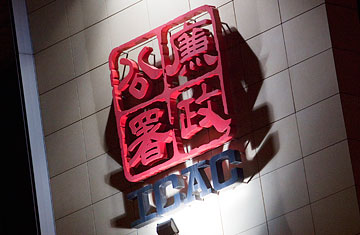
Hong Kong's Independent Commission Against Corruption (ICAC) has taken action against a former top government official and two property tycoons
Updated: April 3, 2012 at 9:40 p.m. EST
Hong Kong has been stunned by its highest-profile arrests over alleged corruption. The action was taken by the territory's tough Independent Commission Against Corruption (ICAC) against a former top government official and two property tycoons. The case resonates locally not just because three of Hong Kong's most prominent citizens are involved. The arrests come in the wake of the recent election for the Chief Executive, the government's top job. During the campaign, collusion between the government and the private sector was a contentious topic, reflecting growing and widespread public discontent over poverty and lack of social mobility even as much of Hong Kong prospers.
Rafael Hui, a former Chief Secretary (the No. 2 position in local government), was arrested along with Thomas and Raymond Kwok, billionaire brothers and joint chairmen of Sun Hung Kai Properties, Hong Kong's biggest developer. According to the Forbes rich list, the Kwok brothers are worth $18.3 billion, which ranks them at No. 27, just behind Google guys Sergey Brin and Larry Page and Amazon's Jeff Bezos. Since the arrests last Thursday, Sun Hung Kai's market cap has shrunk by $5.6 billion. The arrests took place after Thomas Chan, a Sun Hung Kai executive director in charge of land acquisitions, was also detained. Hui, Chan and the Kwoks are out on bail. They have not been formally charged. At a press conference today, speaking publicly for the first time since the arrests, the Kwok brothers said the ICAC's investigation will prove their innocence.
Hong Kong has a deserved reputation as one of the world's least corrupt cities. Transparency International ranks Hong Kong at No. 12 out of 182 countries and territories; the U.S. is No. 24. One reason why officialdom in Hong Kong is relatively clean is that civil servants, from entry-level clerks to top officials, are well paid, thus reducing the temptation to seek illegal sources of income. Another reason is the presence of the powerful ICAC, which acts independently of government.
Yet it is widely acknowledged, and even accepted, that government and big business work closely together. The government's single biggest revenue earner is from land sales to property developers. This revenue, which totaled $8.4 billion last year, enables the government to maintain healthy surpluses while keeping taxes low. Because land is scarce in Hong Kong, the developers in turn realize substantial profits by selling their residential and commercial units at some of the highest prices in the world. That's why Hong Kong is one of the most expensive cities on the planet in which to live and do business.
While the government and the developers are doing well, many ordinary people are hurt by the high cost of living. Hong Kong's wealth gap is the greatest among developed societies. Some 20% of the 7 million population live below the poverty line, defined as a four-person household existing on less than $800 a month. Surging property prices, aggravated by the influx of nouveau riche mainland Chinese, have fueled local resentment toward property developers as well as the government, which is seen as doing little to alleviate the high cost of housing.
This is the first time anyone who has held a post as high up as Chief Secretary has been arrested, and the involvement of the Kwoks, who sit at the pinnacle of Hong Kong society, has added to the intrigue. "It's an earthquake in terms of the seniority of the people," says Steve Vickers, a security expert and former head of Hong Kong's Criminal Intelligence Bureau. The proximity to the Chief Executive election has also had an impact. "During the course of that campaign, there was a lot of anti-feeling expressed about real estate developers and their associations with government," notes Vickers, "so the arrests come at a timely moment."
Not even Hong Kong's current Chief Executive, Donald Tsang, is immune. Tsang, a career civil servant whose term ends in three months, once had an impeccable reputation for probity. Now he is facing calls for his impeachment after the media revealed that Tsang had taken trips on the private jets and yachts of assorted tycoons and that he had signed a lease to rent at a steep discount a 6,000-sq.-ft. penthouse apartment in Shenzhen, across the border in Guangdong province. The owner of the apartment has business interests in Hong Kong that have benefited from rulings by Tsang's executive council, his body of advisers. The ICAC is investigating if Tsang has personally gained from his business relationships.
Tsang's successor is Leung Chun-ying, the first Chief Executive who is neither a tycoon nor bureaucrat. The son of a policeman, Leung is a self-made man who earned his money in the land-surveying business. One of his campaign platforms is to make Hong Kong more affordable for lower-income folk. Whether he lives up to his pledge remains to be seen. But one positive outcome of the Sun Hung Kai scandal is that the system works. "It does demonstrate that Hong Kong has the ability to take action when necessary, and that they're prepared to do so," says Vickers. He adds: "There are many places in Asia where this sort of arrest would have never happened."
